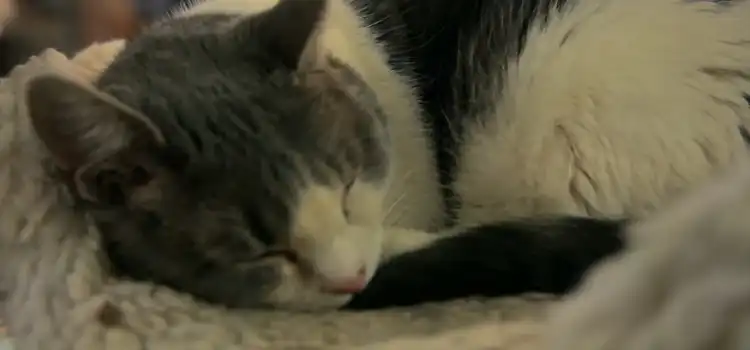It’s common to see cats grooming themselves, but excessive chewing focused right on the tail tip may signal a problem. Tail chewing or sucking seems like an odd feline habit, but it often indicates health or behavioral issues that need attention.
While cats biting tail tips may look silly, the underlying causes are no laughing matter. This article explores the potential reasons for tail tip chewing, from medical conditions to emotional distress. With understanding and care, you can get to the bottom of your cat’s unusual chewing compulsion and restore their tail well-being. It just takes patience and vigilance.
It’s a curious and sometimes concerning habit, but fear not, we’re here to explore the reasons behind this peculiar behavior and provide you with the answers you seek. By reading this article, you’ll gain a better understanding of what might be driving your cat’s tail-chewing and how to address it.

Possible Medical Causes of Tail Chewing
If your cat was previously uninterested in nibbling their tail, new chewing behaviors may signal:
- Allergies or Skin Irritation – Just like humans bite nails or twirl hair when anxious, cats chew tails from allergic itchiness. Treat the source of the irritation to stop chewing.
- Pain or Injury – Cats may excessively lick areas causing pain to try soothing themselves, including chewing sore tail tips. Diagnose and treat the injury.
- Parasites – Fleas, mites, ringworms, and other skin parasites can make tails itchy, triggering chewing at the site. Address the parasitic infection.
- Dental Disease – Tooth and gum infections also cause tail gnawing due to referred pain signals. Dental care can stop this reaction.
- Neurological Disorders – Conditions impacting nerves, spinal cord, or brain could cause abnormal chewing compulsions. Seek neurological assessments.
Any abrupt behavioral changes warrant a trip to the vet to uncover potential underlying medical triggers.
Psychological Reasons for Tail Chewing
In some cases, no medical cause is found for tail chewing. Instead, psychological factors are to blame:
- Boredom or Stress – Inadequate environmental stimulation and enrichment can lead cats to develop repetitive grooming habits. More interactive playtime, treats, cat trees, and toys to “hunt” help provide an outlet.
- Separation Anxiety – Time alone, while owners are away, can manifest as tail chewing or sucking for comfort. Ease separation stress with calming pheromones.
- Trauma – Exposure to frightening experiences sometimes causes obsessive grooming. Help cats feel secure again through routines and positive reinforcement.
- Attention-Seeking – Tail chewing may become an attention-getting mechanism. Redirect by engaging with a cat for positive behaviors instead of biting.
While medical issues take priority, don’t neglect emotional health factors contributing to new tail chewing fixes either.
Ways to Stop Tail Tip Biting
Whether the chewing stems from medical or behavioral causes, here are tips to curb chomping:
- Elizabethan Collars: The “cone of shame” prevents chewing access while healing.
- Bandaging: Wrap tail tips lightly to deny chewing.
- Anti-chew Sprays: Bitter sprays deter licking and chewing.
- Anxiety Medications: Short-term anti-anxiety or anti-obsession drugs may be prescribed in extreme cases of psychogenic chewing.
- Environment Enrichment: Cat trees, food puzzles, catnip, and playtime distract from chewing fixation.
- Remove Stressors: Limit triggers like loud noises, changes in routine, or new pets contributing to chewing compulsions.
With detective work and patient training, your cat can kick the tail-chewing habit.
When to See the Vet About Tail Chewing
Contact your veterinarian promptly if you notice any tail chewing or sucking lasting more than a day or two. The sooner the cause can be found, the quicker you can curb tail tip biting for good. Persistent chewing risks breaks in the skin, abscesses, bone exposure, and even amputation if wounds become severe. Don’t write off tail nibbling as a harmless quirk – seek answers to address this unusual cat conduct fast.
Wrapping Up
Cats injuring tail tips through obsessive biting or sucking behaviors clearly have an underlying issue requiring attention. Don’t neglect new tail chewing habits as just “one of those cat things.” Whether stemming from medical problems or psychological distress, help is available. With thorough veterinary exams, diagnostics, training, medication, and enrichment strategies, you can solve the root cause of tail chewing to restore your cat’s health and happiness. Nip this problem in the bud before it leads to lasting tail trauma.
People Also Asked
Why Does My Cat Suddenly Bite The Tip Of His Tail?
New chewing behaviors may signal injuries, skin conditions, dental disease, parasites, anxiety, boredom, or neurological disorders warranting veterinary evaluation.
Should I Worry If My Cat Chews His Tail Tip?
Tail-chewing behavior can be harmful, especially if it leads to skin damage or infections. It’s essential to address the underlying cause of the behavior to prevent any health issues and ensure your cat’s well-being. Seek veterinary help promptly. Persistent chewing can cause wounds and serious tail damage. Identifying the underlying cause is key.
When Do You Need To Amputate A Cat’s Tail?
If unrelenting tail chewing or biting leads to severe, unhealing wounds, bone exposure, and irreparable tissue damage, amputation may become the humane option.
How Can I Tell If My Cat Is Chewing His Tail Due To Medical Issues?
If you suspect that medical issues may be causing your cat’s tail-chewing behavior, look for signs of skin irritation, redness, or other abnormal changes in the tail area. A visit to the veterinarian is recommended to identify and address any medical concerns.
What Should I Do If My Cat Is Chewing His Tail Due To Stress?
To help your cat with stress-induced tail-chewing, reduce stressors in their environment, maintain a consistent routine, and provide a safe and quiet space. You can also consider using pheromone diffusers to help calm your cat.
Can Compulsive Tail-Chewing Be Treated?
Compulsive tail-chewing can be challenging to treat, but it’s not impossible. Consulting a feline behaviorist can provide specialized guidance and strategies to address compulsive behaviors.
